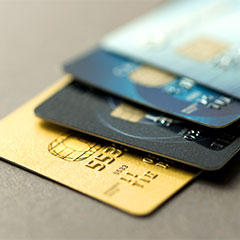Tracking Plastic Spending Accounts for Hidden Assets
September 16, 2016 | Divorce Litigation, Fraud Prevention
 Cash is the most difficult item to trace when a bankruptcy or divorce case involves embezzlement, fraud, defalcation, or hidden assets. It’s interchangeable and leaves no record of ownership or transfer if kept outside of the banking system. It’s very rare that we keep track of the serial numbers on our currency.
Cash is the most difficult item to trace when a bankruptcy or divorce case involves embezzlement, fraud, defalcation, or hidden assets. It’s interchangeable and leaves no record of ownership or transfer if kept outside of the banking system. It’s very rare that we keep track of the serial numbers on our currency.
Converting Stolen Cash into Economic Benefit
However, embezzled cash is useless unless it can be spent. Thus, people who steal cash are faced with a significant problem — how to convert it to economic benefit without leaving an easily traceable trail. In large-scale and sophisticated schemes, there may be offshore accounts, multi-layered wire transfers, dummy corporations, and elaborate money laundering schemes to convert the ill-gotten gains to disposable income.
In general it’s typical to encounter more “vanilla” sorts of crimes. Money orders are easy to obtain, are readily negotiable and require no substantial identification. However, it’s inconvenient to utilize them as currency, unwieldy to maintain a significant amount of funds, and some money orders have expirations dates. On the other hand, credit card companies are quite accustomed to receiving payments on accounts in the form of money orders.
Therein lies the solution for some perpetrators: Overpay a credit card account. The account will then carry a credit balance from which future charges will be deducted. A novice perpetrator might use an existing credit card for this scheme. But more sophisticated embezzlers apply for new credit cards, maybe even in a fictitious name.
Uncovering Plastic Spending Accounts
In order to uncover this scheme, a credit report must be obtained and all credit inquiries traced to determine if they represent the issuance of a new card. Additionally, the appearance of recently-acquired assets, vacations, trips and other items must be traced to discover the source of payment.
Requests for discovery of invoices associated with these assets are essential to this effort and the failure to produce them is a red flag. All transaction records must be obtained from the issuer once credit cards have been identified. Examining these reveals if overpayments have occurred and also identifies transactions that may point to other unreported assets. For example, payment of utility bills with the card should be traced as it could lead to the existence of unknown real estate.
Seeking Forensic Expertise
Be sure to turn to skilled and experienced financial investigators who know how to follow the cash when your case involves fraud, embezzlement defalcation or hiding assets in a divorce or bankruptcy situation, or other incidents of financial wrongdoing.
